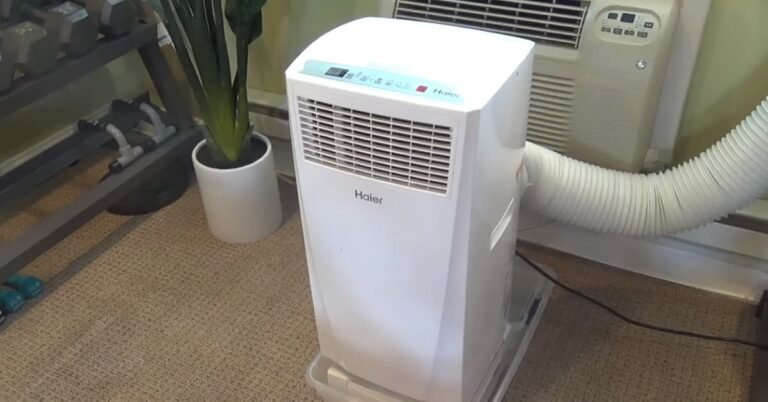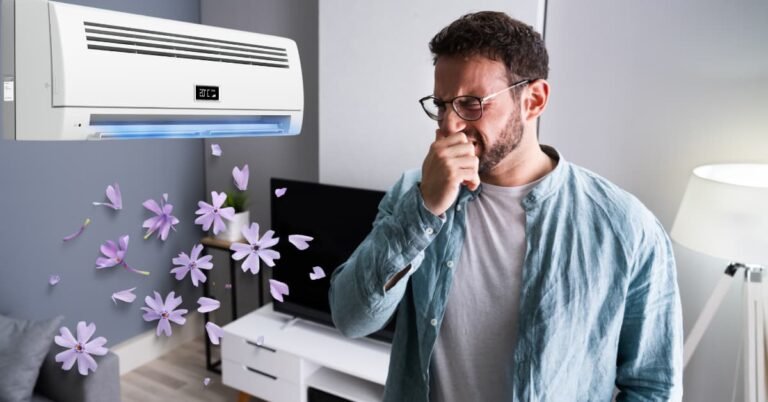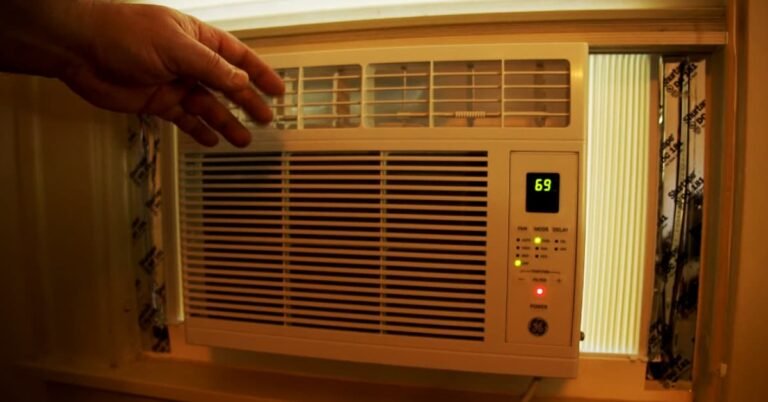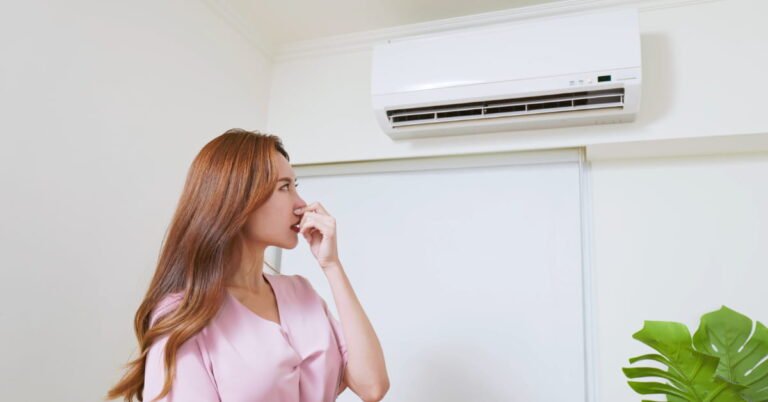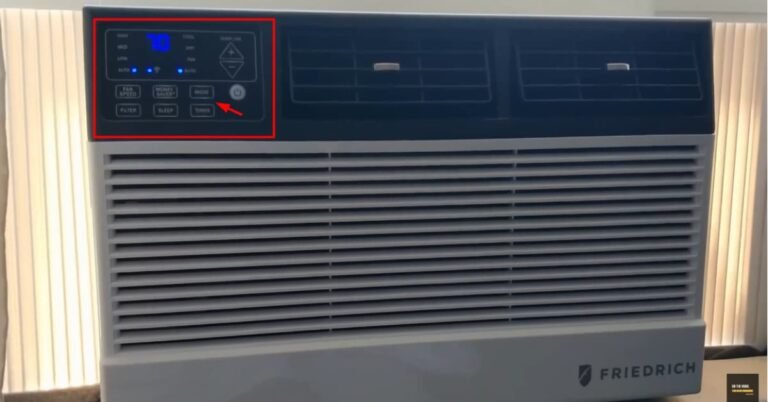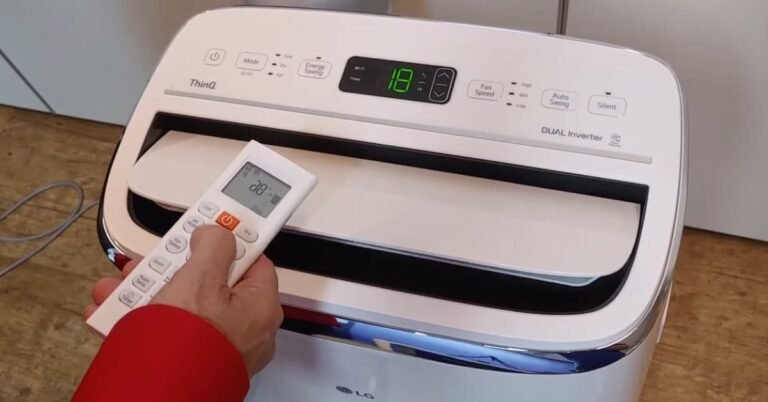Why is My Air Conditioner Blowing Hot Air? 8 Solution
Experiencing hot air instead of refreshing coolness from your air conditioner can be a frustrating situation.
Various factors can contribute to this issue, and understanding them will help you troubleshoot and resolve the problem effectively.
In this guide, we will explore different potential causes and provide step-by-step solutions for each.
Reasons For Air Conditioners Blowing Hot Air
When your air conditioner blows hot air instead of cold air, there can be several potential causes. Some of the common causes include:
- Thermostat settings
- Air filter blockage
- Refrigerant leak
- Compressor issues
- Electrical problems
- Frozen evaporator coil
- Condenser unit problems
- Ductwork issues
Each problem below is solved step-by-step.
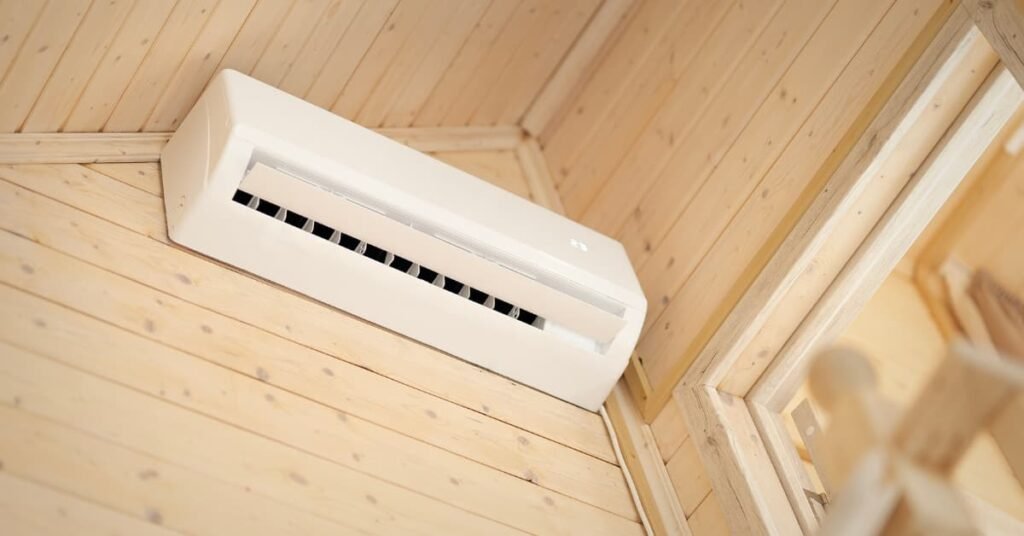
1. Thermostat settings
The thermostat is crucial for regulating your air conditioner’s cooling cycle and maintaining the desired temperature. Incorrect settings can cause the air conditioner to blow hot air, even if the rest of the system is functioning correctly.
Let’s explore how to check and adjust your thermostat settings to address this issue.
Solution:
1. Check the thermostat settings: Ensure that the thermostat is set to the desired cooling mode and temperature.
2. Verify the fan setting: If the fan is set to “ON,” the air conditioner will blow air even when it’s not in the cooling cycle. Change the fan setting to “AUTO” for proper operation.
3. Calibrate the thermostat: If you suspect a calibration issue, consult the manufacturer’s instructions to recalibrate the thermostat or consider contacting a professional for assistance.
4. Remove heat sources: Ensure that heat-generating appliances or sources (e.g., lamps, electronics) are kept away from the thermostat, as they can influence temperature readings and affect cooling performance.
2. Air filter blockage
A common cause of hot air from the air conditioner is a clogged or dirty air filter. When the air filter becomes obstructed, it hampers airflow and prevents proper cooling.
Let’s delve into how to address this issue.
Solution:
1. Locate the air filter: Check the air handler unit or return air grille for the air filter’s location.
2. Turn off the air conditioner: Before handling the filter, switch off the air conditioner to ensure safety.
3. Remove the filter: Carefully remove the air filter from its housing, following any instructions provided by the manufacturer.
4. Inspect and clean the filter: Examine the filter for dirt, dust, or debris buildup. If reusable, clean the filter using mild soap and water, or use a vacuum cleaner. If excessively dirty or damaged, replace it with a new filter.
5. Reinstall the filter: Place the cleaned or new filter back into its housing, ensuring it is properly fitted.
6. Turn on the air conditioner: Once the filter is securely in place, switch on the air conditioner and check if cool air is now being circulated.
3. Refrigerant leak
A refrigerant leak is another potential cause of an air conditioner blowing hot air.
Refrigerant absorbs heat from indoor air, creating a cooling effect and transferring it outside. A leak in the refrigerant lines compromises the air conditioner’s cooling capacity.
Let’s explore this issue further and find solutions to fix it.
Solution:
1. Detecting the leak: Refrigerant leaks are best detected by a qualified HVAC technician using specialized tools. Contact a professional to inspect and identify the location of the leak accurately.
2. Repair the leak: Once the leak is located, the technician will determine the appropriate repair method. It may involve sealing a small leak or replacing a damaged section of the refrigerant line. Leave this task to the professionals to ensure safety and proper repair.
3. Recharge the refrigerant: After fixing the leak, the technician will recharge the refrigerant to the manufacturer’s specified levels. This process requires precision to avoid undercharging or overcharging the system, which can affect its performance.
4. Test the system: After recharging, the technician will assess the air conditioner’s performance by monitoring the cooling output and ensuring there are no further issues.
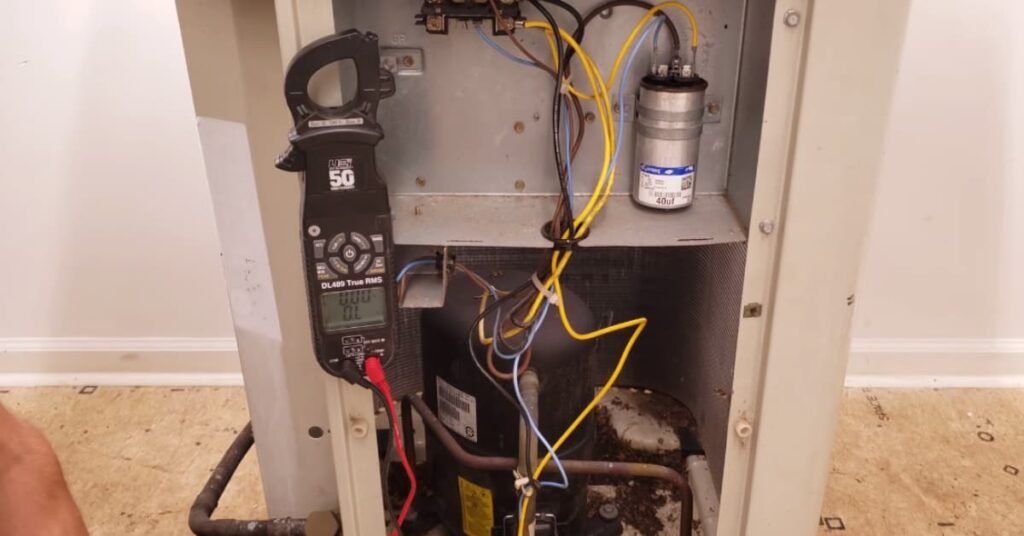
4. Compressor issues
The compressor is a vital component of the air conditioning system, responsible for circulating refrigerant and enabling heat exchange.
If the compressor malfunctions, it can result in hot air instead of cool air from the air conditioner.
Let’s explore possible solutions for compressor-related problems
Solution:
1. Check power supply: Ensure that the air conditioner is receiving proper electrical power. Check the circuit breaker and ensure it is not tripped. If necessary, reset the breaker or replace any blown fuses.
2. Clean the compressor unit: Dust and debris can accumulate on the compressor unit, affecting its performance. Turn off the air conditioner, then carefully clean the compressor’s exterior using a soft brush or damp cloth. Remove any vegetation or obstructions in the immediate surroundings.
3. Check the fan motor: A faulty fan motor can cause compressor issues. If the outdoor fan is not spinning or functioning properly, it can lead to the compressor overheating. Contact a professional technician to inspect and repair the fan motor if needed.
4. Refrigerant levels: Low refrigerant levels can also impact the compressor’s efficiency. If you suspect a refrigerant issue, consult a professional technician to assess and recharge the system as necessary.
5. Electrical problems
Electrical issues can cause your air conditioner to malfunction and blow hot air. Problems with connections, wiring, or components can disrupt the cooling process.
Let’s delve into this issue and explore how to fix it.
Solution:
1. Check the power supply: Begin by ensuring that your air conditioner is receiving electrical power. Check the circuit breaker and ensure it is not tripped. If necessary, reset the breaker or replace any blown fuses.
2. Inspect wiring and connections: Turn off the air conditioner and carefully inspect the wiring and connections for any signs of damage, loose connections, or corrosion. If you notice any problems, it’s best to consult a professional HVAC technician for repairs.
3. Test capacitors and relays: Faulty capacitors or relays can disrupt the electrical current and prevent proper cooling. A professional technician can test these components and replace them if necessary.
6. Frozen evaporator coil
A frozen evaporator coil can cause your air conditioner to blow hot air. When the coil becomes covered in ice or frost, it hampers the cooling process.
Let’s explore how to address this issue.
Solution:
1. Turn off the air conditioner: Switch off the air conditioner to allow the frozen evaporator coil to thaw properly.
2. Check for airflow restrictions: Inspect the air filters, vents, and return air registers for any obstructions. Ensure that they are clean and free from debris.
3. Replace dirty filters: If the air filters are dirty, replace them with clean ones. Dirty filters restrict airflow and can contribute to a frozen coil.
4. Allow the coil to thaw: It’s essential to let the frozen evaporator coil thaw completely before turning on the air conditioner again. This process may take several hours. You can expedite the thawing process by using fans or gentle heat sources (never use direct heat).
5. Schedule a professional inspection: Persistent freezing may indicate an underlying issue, such as a refrigerant leak or faulty blower motor. Contact an HVAC technician to inspect and repair the system if needed.
7. Condenser unit problems
The condenser unit plays a crucial role in releasing heat from the air conditioner. If the condenser is not functioning properly, it can result in the air conditioner blowing hot air.
Let’s explore this issue and find solutions to fix it.
Solution:
1. Check for power supply: Ensure that the condenser unit is receiving proper electrical power. Verify the circuit breaker and replace any blown fuses if necessary.
2. Remove debris: Carefully inspect and clean the area around the condenser unit. Remove any leaves, grass, or debris that may obstruct airflow.
3. Clean the condenser coils: Over time, dirt and debris can accumulate on the condenser coils, reducing their efficiency. Turn off the power to the condenser unit and use a soft brush or a specialized coil cleaner to remove the dirt gently.
4. Straighten coil fins: Bent or damaged coil fins can impede airflow. Use a fin comb or a gentle tool to straighten any bent fins, allowing for better heat transfer.
5. Call a professional: If you have completed the basic steps and the condenser unit still has issues, it’s recommended to consult a professional technician. They can diagnose and repair more complex problems (such as refrigerant leaks or faulty components) safely and effectively.
8. Ductwork issues
Problems with the ductwork in your air conditioning system can lead to hot air blowing from the vents. Leaks, blockages, or improper insulation can all contribute to this issue.
Let’s explore how to identify and address these ductwork issues.
Solution:
1. Inspect the ductwork: Begin by visually inspecting the ductwork for any visible signs of damage or disconnected sections. Pay close attention to areas such as attics, crawl spaces, or basements.
2. Seal air leaks: Any visible air leaks in the ductwork should be sealed using foil tape or mastic sealant. This helps prevent cooled air from escaping and hot air from entering.
3. Clear duct blockages: If you suspect a blockage, check the vents and registers for dust, debris, or obstructions. Clean or clear them as necessary.
4. Ensure proper insulation: Properly insulating the ductwork prevents heat gain or loss during the cooling process. Insulate any exposed ducts using insulation sleeves or foam insulation.
Should I turn off the AC if it is blowing warm air?
No one likes it when their AC unit starts blowing warm air on a hot summer’s day. It’s uncomfortable, frustrating, and an immediate cause for concern.
Before calling a technician, you might ask yourself, “Should I turn off the AC if it’s blowing warm air?” Here’s what you need to know to diagnose and potentially correct the issue.
Immediate Steps to Take
- Turn off Your AC: It’s usually wise to shut down your air conditioner if it’s not performing as expected. Turning it off can prevent further damage to the system and give you time to troubleshoot.
- Increase Airflow: Check for closed vents or blocked registers that might be impacting airflow.
- Examine the Thermostat: Ensure it’s set to “cool” and that the temperature is set lower than the room’s current temperature.
When to Call a Professional?
There are some problems that you should not attempt to fix on your own unless you have professional HVAC training.
These include but are not limited to:
- Refrigerant issues: Handling refrigerant requires special tools and training due to its hazardous nature.
- Electrical problems: Electrical diagnostics and repairs can be dangerous and are best left to the professionals.
- Complex mechanical problems: If you’re unsure about a particular issue or how to fix it, it’s always safer to call for help.
Preventive Measures
Regular maintenance is key to preventing your AC from blowing warm air in the first place.
Here are some tips:
- Change your air filters regularly (every 1-3 months).
- Schedule annual maintenance from a qualified HVAC technician.
- Keep the area around the outdoor unit clear from debris and vegetation.
- Regularly inspect and clean the condensate drain line to prevent blockages.
Conclusion
There are various reasons why your air conditioner may be blowing hot air. Some issues can be addressed with simple troubleshooting steps.
By following the step-by-step solutions provided for each problem, you should be able to diagnose and fix any issues that may be causing your air conditioner to blow hot air.
Regular maintenance and inspections can also help prevent these problems and keep your air conditioning system running efficiently.
If you have further questions or require additional assistance, please let me know!

